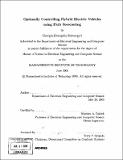Optimally controlling hybrid electric vehicles using path forecasting
Author(s)
Katsargyri, Georgia-Evangelina
DownloadFull printable version (6.926Mb)
Alternative title
Optimally controlling HEVs using path forecasting
Other Contributors
Massachusetts Institute of Technology. Dept. of Electrical Engineering and Computer Science.
Advisor
Munther A. Dahleh.
Terms of use
Metadata
Show full item recordAbstract
Hybrid Electric Vehicles (HEVs) with path-forecasting belong to the class of fuel efficient vehicles, which use external sensory information and powertrains with multiple operating modes in order to increase fuel economy. Their main characteristic is that the decision to charge and discharge the battery is made in part by using a prediction of future road conditions. The increasing presence of GPS navigational systems in the standard feature sets of the modern vehicles suggests that path predictive methods applied to HEVs constitute one of the most promising directions towards the solution of serious problems of our era, such as the energy problem, the increasing cost of oil, and the greenhouse gas emissions. In the current project we are given a route and an HEV simulation model, and we aim to minimize the fuel consumption of the vehicle along the route. Towards this direction, we adopt a novel way of decomposing the route into a series of route segments connected to each other and linking the origin to the destination. For each route segment, the road grade, the segment length, and the nominal speed are available. Then, the main idea of our method is to prescribe those set-points of the state of charge of the battery for each road segment, that result in the most fuel efficient travel between the origin and the destination.
Description
Thesis (S.M.)--Massachusetts Institute of Technology, Dept. of Electrical Engineering and Computer Science, 2008. Includes bibliographical references (p. 63-65).
Date issued
2008Department
Massachusetts Institute of Technology. Department of Electrical Engineering and Computer SciencePublisher
Massachusetts Institute of Technology
Keywords
Electrical Engineering and Computer Science.